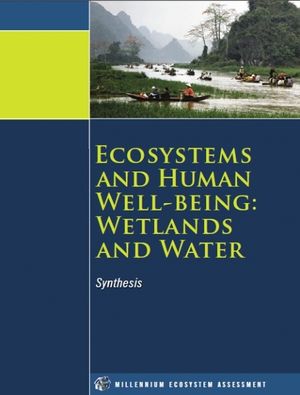Ecosystems and Human Well-being: Wetlands and Water: Foreword
This is part of the Millennium Ecosystem Assessment report Ecosystems and Human Well-being: Wetlands and Water.
Synthesis Team Co-chairs: C. Max Finlayson, Rebecca D’Cruz, Nick Davidson
Synthesis Team Members: Jacqueline Alder, Steve Cork, Rudolf de Groot, Christian Lévêque, G. Randy Milton, Garry Peterson, Dave Pritchard, Blake D. Ratner, Walter V. Reid, Carmen Revenga, María Rivera, Frederik Schutyser, Mark Siebentritt, Mishka Stuip, Rebecca Tharme
Contributing Authors: Stuart Butchart, Ellen Dieme-Amting, Habiba Gitay, Steve Raaymakers, Douglas Taylor
Extended Writing Team: MA Coordinating Lead Authors, Lead Authors, Contributing Authors, and Working Group Coordinators
Review Editors: José Sarukhán and Anne Whyte (Co-chairs) and MA Board of Review Editors
Since the inception of global assessments on ozone depletion and climate change, the global policy process has been better informed, and decision-makers are able to take more effective and timely decisions. The Millennium Ecosystem Assessment followed in the footsteps of these assessments and was designed to meet the need for information about the consequences of ecosystem change for human well-being. It sought in particular to strengthen the link between scientific knowledge and decision-making.
It provided an assessment, not just a review of existing knowledge and understanding, of the current state of our ecosystems and the many services they support and provide to people. It significantly enhanced our understanding of the direct drivers of change to wetlands and showed how they would fare under a range of future scenarios. It analyzed future challenges and response options that could allow us to maintain, to the greatest extent possible, the ecosystem services on which we all depend.
The Convention on Wetlands (Ramsar, I.R. Iran, 1971) has recognized from the start that the MA can and should provide the Contracting Parties to the Convention, and all involved in the conservation and wise use of wetlands, with new understanding and insights into how best they can meet the objectives of the Convention. The Convention’s Standing Committee, Secretariat, and Scientific and Technical Review Panel have supported and contributed to the work of the MA throughout.
This report, synthesizing the findings of the MA on inland, coastal, and near-shore marine wetlands, is the key product of the MA for the Ramsar Convention. It draws on the work of approximately 1,360 experts who compiled the many chapters of the MA reports. The synthesis stresses the link between wetlands and water and will help us set the future agenda for Ramsar.
During its work, the MA made a significant contribution to the work of the Convention’s STRP. Several of the MA’s authors contributed to the STRP’s work that will be considered by the Convention’s COP9 in November 2005. Through this “cross-fertilization” of ideas it became apparent that the MA’s conceptual framework provides a structure for the delivery of the Convention’s central concept of “wise use” of all wetlands. Furthermore, the STRP has recognized that the ecosystem terminologies adopted by the MA provide a valuable approach to its work of updating and harmonizing the terms and definitions used by the Convention, notably those concerning ecological character and wise use. Finally, the existing Ramsar “Toolkit” of Wise Use Handbooks is enhanced and supported by the MA’s advice on response options.
We therefore commend this synthesis report to you, and urge all those concerned with the Ramsar Convention and with securing the wise use of wetlands to read it and use its findings to raise awareness of the role of wetlands in securing sustainable water supplies as well as providing a range of other vital ecosystem services.
Peter Bridgewater
Secretary General
Ramsar Convention on Wetlands
Gordana Beltram
Chair, Standing Committee
Ramsar Convention on Wetlands
Terms of Use
The copyright for material on this page is the property of the World Resources Institute. Click here for the Terms of Use (Ecosystems and Human Well-being: Wetlands and Water: Foreword).
Disclaimer: This chapter is taken wholly from, or contains information that was originally written for the Millennium Ecosystem Assessment as published by the World Resources Institute. The content has not been modified by the Encyclopedia of Earth.
|
|
